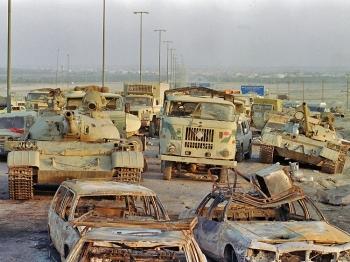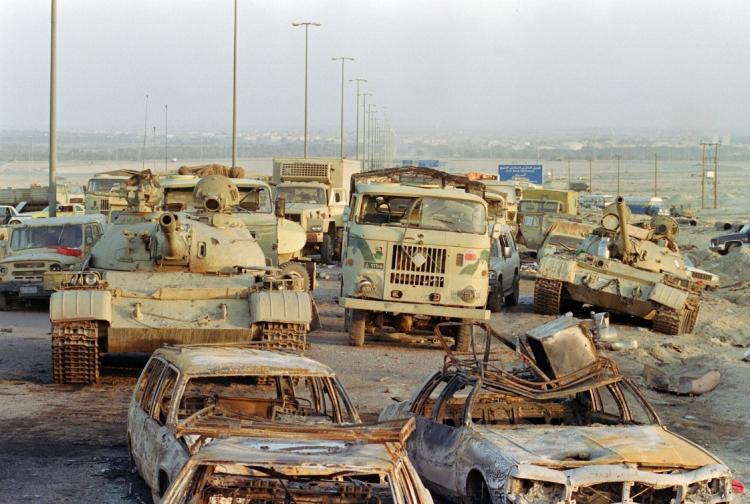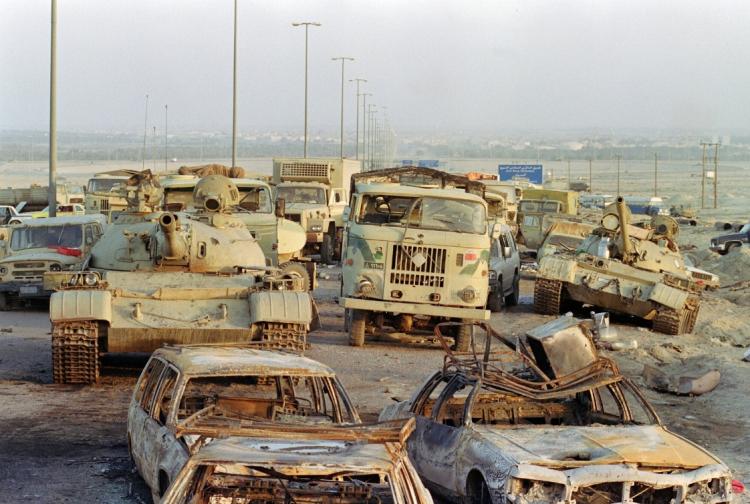The United Nations’ compensation commission on Thursday paid $880 million to Kuwaiti claimants for their losses during Iraq’s invasion of the small Gulf nation over 20 years ago.
The majority of the compensation money, which comes through the U.N.’s Compensation Commission, is from the sale of Iraqi oil under the U.N.’s Oil-for-Food program.
The Oil-for-Food program was established by the U.N. Security Commission in 1996 to provide humanitarian necessities to the beleaguered Iraqi people and to pay for Kuwaiti reparations. In 2000, the program funneled an estimated 72 percent of Iraq’s oil revenues to humanitarian projects and its compensation fund.
Thursday’s payment brings the total amount paid to Kuwaiti claimants to $32.2 billion with $21.1 billion still owing. The U.N. says the money has gone to settle over 1.5 million claims.
The claimants receiving funds include individuals, corporations, international organizations, and governments.
With just over 2.5 million people, Kuwait, which is slightly smaller than New Jersey, holds 9 percent of the world’s oil reserves.
In 1990, under the command of Saddam Hussein, Iraq invaded the small state. An international coalition headed by the United States drove the Iraqis out, liberating Kuwait in February 1991.
On Tuesday, Iraq approved two new bank accounts to handle oil and other revenues. Next July, the Development Fund for Iraq (DFI), which was established after Hussein was ousted in 2003 to handle government funds, will expire.
Both accounts will be in the U.S. federal reserves. One of which will hold 95 percent of government revenues the other will hold the 5 percent of revenues allocated to Kuwait reparations.
“The plan [for the new accounts] will take effect July 1st, pending Security Council approval,” Iraqi government spokesman Ali al-Dabbagh told AFP.
“Both accounts will be held by the U.S. Federal Reserve to avoid foreign claims. ... These accounts will hold not only revenues from oil, but also all the money we can retake from the former regime,” al-Dabbagh added.
Before 1990, Kuwait and Iraq had had relatively good relations with Kuwait giving Iraq money to battle Iran in the 1980s.
In an address Feb. 26 to mark the 20th anniversary of Kuwait’s liberation, U.N. Secretary-General Ban Ki-moon said that he sees the Gulf neighbors returning to good standing with one another. “Kuwait and Iraq stand at the dawn of a new era of peaceful coexistence and friendly relations,” Ban said in a press release.
He said that stabilizing relations between the countries remains a “formidable challenge,” but one that he believes can be overcome.
“I have faith in their resolve to move in that direction and achieve full closure,” he said, adding that the U.N. would continue to support the process.
The majority of the compensation money, which comes through the U.N.’s Compensation Commission, is from the sale of Iraqi oil under the U.N.’s Oil-for-Food program.
The Oil-for-Food program was established by the U.N. Security Commission in 1996 to provide humanitarian necessities to the beleaguered Iraqi people and to pay for Kuwaiti reparations. In 2000, the program funneled an estimated 72 percent of Iraq’s oil revenues to humanitarian projects and its compensation fund.
Thursday’s payment brings the total amount paid to Kuwaiti claimants to $32.2 billion with $21.1 billion still owing. The U.N. says the money has gone to settle over 1.5 million claims.
The claimants receiving funds include individuals, corporations, international organizations, and governments.
With just over 2.5 million people, Kuwait, which is slightly smaller than New Jersey, holds 9 percent of the world’s oil reserves.
In 1990, under the command of Saddam Hussein, Iraq invaded the small state. An international coalition headed by the United States drove the Iraqis out, liberating Kuwait in February 1991.
New accounts
On Tuesday, Iraq approved two new bank accounts to handle oil and other revenues. Next July, the Development Fund for Iraq (DFI), which was established after Hussein was ousted in 2003 to handle government funds, will expire.
Both accounts will be in the U.S. federal reserves. One of which will hold 95 percent of government revenues the other will hold the 5 percent of revenues allocated to Kuwait reparations.
“The plan [for the new accounts] will take effect July 1st, pending Security Council approval,” Iraqi government spokesman Ali al-Dabbagh told AFP.
“Both accounts will be held by the U.S. Federal Reserve to avoid foreign claims. ... These accounts will hold not only revenues from oil, but also all the money we can retake from the former regime,” al-Dabbagh added.
Returning to peace
Before 1990, Kuwait and Iraq had had relatively good relations with Kuwait giving Iraq money to battle Iran in the 1980s.
In an address Feb. 26 to mark the 20th anniversary of Kuwait’s liberation, U.N. Secretary-General Ban Ki-moon said that he sees the Gulf neighbors returning to good standing with one another. “Kuwait and Iraq stand at the dawn of a new era of peaceful coexistence and friendly relations,” Ban said in a press release.
He said that stabilizing relations between the countries remains a “formidable challenge,” but one that he believes can be overcome.
“I have faith in their resolve to move in that direction and achieve full closure,” he said, adding that the U.N. would continue to support the process.


